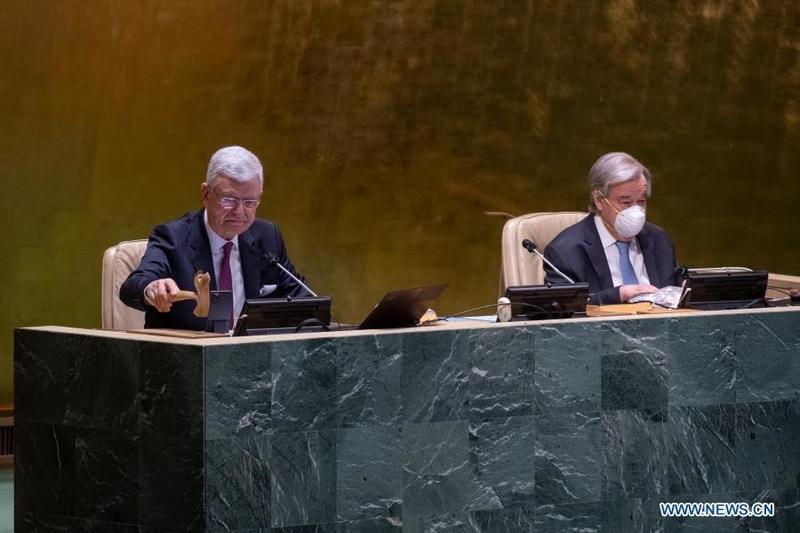 United Nations Secretary-General Antonio Guterres (right) and President of the 75th Session of the UN General Assembly Volkan Bozkir attend the UN General Assembly briefing on the Call to Action for Human Rights at the UN headquarters in New York on Feb 24, 2021. (ESKINDER DEBEBE / UN PHOTO / HANDOUT VIA XINHUA)
United Nations Secretary-General Antonio Guterres (right) and President of the 75th Session of the UN General Assembly Volkan Bozkir attend the UN General Assembly briefing on the Call to Action for Human Rights at the UN headquarters in New York on Feb 24, 2021. (ESKINDER DEBEBE / UN PHOTO / HANDOUT VIA XINHUA)
United Nations Secretary-General Antonio Guterres said on Feb 24 that human rights must not only be available to the privileged few and joint efforts must be made to deliver these to everyone in the world.
“Much like COVID-19 vaccines, human rights will not lead to a healthier world if they are only available to the privileged few,” the UN chief told the UN General Assembly briefing on the Call to Action for Human Rights.
Addressing the Human Rights Council, Guterres on Feb 24 last year launched a Call to Action for Human Rights. He said these rights are powerful tools for preventing conflict, reducing human suffering and building a just and equitable world.
“We need renewed, concerted, global determination to ensure the protection of human rights of all people, everywhere and in all situations,” the UN chief briefed member states exactly one year after the release of the call.
“We must all join forces to deliver,” the top UN official added.
“Only by working together can we forge a new social contract that reflects respect and protection for all people and is rooted in universal human rights,” he noted.
“As we enter the second year of the Call to Action, I look forward to working closely with all of you to fulfil the highest aspirations of the people of the world — human rights and dignity for all,” said Guterres.
Noting that with the support of member states over the last year, he said that the Call to Action “is making important progress”.
The UN family is working together to ensure that human rights are at the heart of COVID-19 socioeconomic response plans, he said.
Ghana on Feb 24 became the first country to receive a COVID-19 vaccine under a World Health Organization-led initiative to ensure the equitable distribution of supplies.
The initiative, known as COVAX, accepts donations of cash and vaccines from nations that have bought or produced jabs, and redistributes inoculations to countries that would otherwise struggle to secure these.
As an aircraft carrying 600,000 doses of the AstraZeneca and Oxford vaccine produced by the Serum Institute of India landed in Ghana’s capital, Accra, the WHO said vaccinating everyone is not only fair but the best way to protect the planet.
“These 600,000 COVAX vaccines are part of an initial tranche of deliveries … which represent part of the first wave of COVID vaccines headed to several low- and middle-income countries,” the WHO said in a joint statement with the United Nations International Children’s Emergency Fund, or UNICEF.
Anne-Claire Dufay, from UNICEF Ghana, and Francis Kasolo, the WHO’s representative there, was quoted as saying: “This is a momentous occasion, as the arrival of the COVID-19 vaccines into Ghana is critical in bringing the pandemic to an end.”
The WHO has repeatedly said rich nations must do all they can to share vaccines with poorer nations to avoid the pandemic that continues to rage in parts of the world where dangerous new variants could subsequently develop.
COVAX hopes to deliver 2.3 billion doses by the end of the year, including 1.8 billion at no cost, and vaccinate 20 percent of the populations of the world’s poorer nations by year-end.
China has donated doses of its Sinopharm vaccine to many developing countries.
COVAX has accumulated 330 million doses for 145 countries and raised US$6 billion to purchase jabs.
After elaborating on some of the areas where progress has been made, the UN chief also noted that the UN will launch a first-of-its-kind “One Stop Digital Shop”, bringing together a wealth of resources on implementing human rights in the digital space.
“Our enduring challenge is to transform the promise of the UN Charter and the Universal Declaration of Human Rights into real-world change on the ground. It is to look at our contemporary challenges with a human rights lens,” said the UN chief, noting that “this is why my Call to Action extends beyond the UN family”.
It is also a call to all member states, to parliamentarians, to the business community, to civil society and to people everywhere, he said.
“We shoulder a collective responsibility.
Xinhua contributed to the story.


